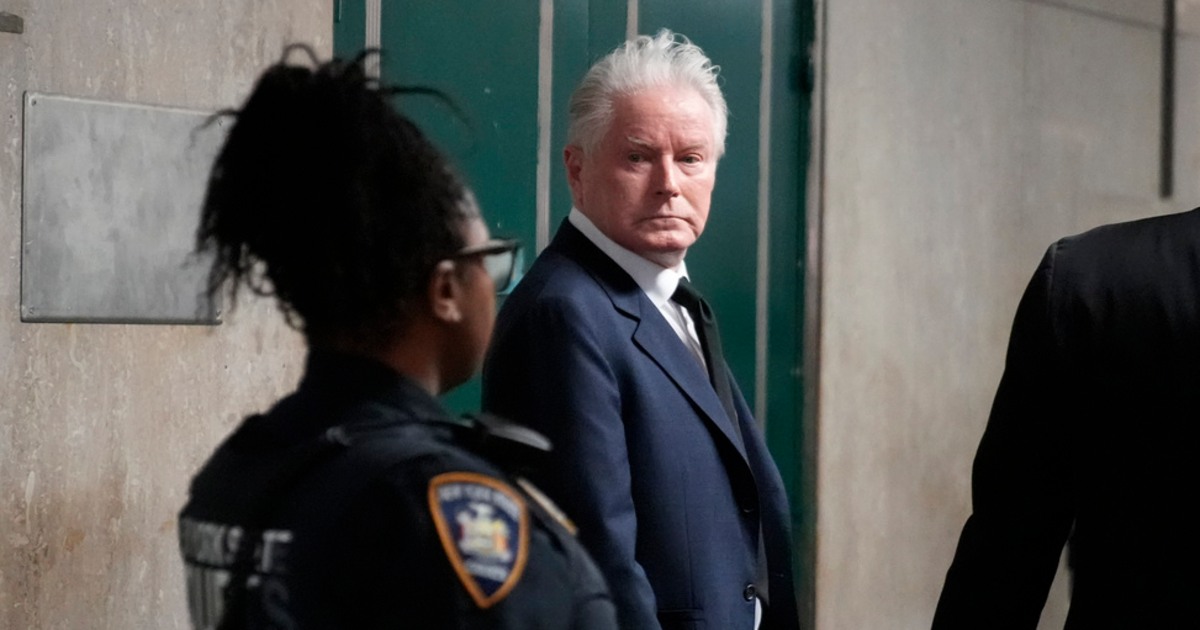Perspective always helps to evaluate phenomena.
Now, half a century after Don McLean broke the world with his
American Pie
, we can unhesitatingly proclaim that almost everything about it was exceptional.
Starting with its length, those infrequent eight minutes and 32 seconds that made it the longest song to reach number 1 in the United States for 49 years.
And continuing with its unusual ambition, this review in six very long stanzas of the country's turbulent socio-cultural history during the 1960s, defined by intergenerational conflicts, street protests and the desire for greater social justice.
A Paramount+ documentary,
The Day The Music Died
(The day the music died), now reconstructs not only the history of the song, but also tries to clear its meaning almost word by word.
Urgent notice: not even with such an illustrious excuse, the author has wanted to let go of the big questions that still remain about those 119 verses.
More information
From Bob Dylan to Los Chunguitos: greatest hits of philosophy (sung)
The origin of the whole story is well known.
Donald McLean was a 13-year-old boy who earned a few cents selling newspapers on the streets of New Rochelle, on the outskirts of New York, on that February 3, 1959, when three of the most famous musicians in the country, Buddy Holly, Ritchie Valens and Big Bopper lost their lives when their small plane crashed in a remote Iowa cornfield. That was "the day the music died" that
American Pie talks about.
, a traumatic episode that over the years would acquire a deep symbolic dimension: the happy fifties were coming to an end, a candid, hopeful time with an innocent gaze, and the decade of great transformations, upheavals and conflicts, from the Cold War to Vietnam, burst forth. the assassinations (John Fitzgerald and Robert Kennedy, Martin Luther King) or the arrival of man on the Moon.
They weren't easy years for young McLean either, traumatized since the sudden death of his father, victim of a heart attack, when he was barely 15 years old.
A great fan of traditional music, particularly The Weavers, Donald struck up a certain friendship with the city's folklorist par excellence, Pete Seeger, and began to frequent the stages of New York's Greenwich Village, the same bohemian neighborhood he had seen be born to Dylan.
Only the prospects, in his case, were far from rosy.
His record release,
Tapestry
, went completely unnoticed in 1970, even though Carole King took advantage of that same title to record one of the most influential albums of the decade just one year later.
And her small label, MediaArts, barely invested in promotion when the second LP,
American Pie,
was released in October 1971.
However, that endless rant of eight long minutes with which the work was opened would end up changing the life of its signer.
Don had set out to “write a song about the end of the American dream” and took on his own challenge with feverish passion.
In the Paramount documentary it is revealed that the lyrics were written in one hour and that the final version of American Pie barely uses half of the existing verses.
"It could have reached 16 minutes," says the producer of
The Day The Music Died
, Spencer Proffer, for whom the most amazing thing about this song is that "it spoke to its time, but in many aspects it is still applicable to the convulsive moment current".
McLean applied from his friend Pete Seeger the teaching that every song, however narrative it may be, must have a very hum-able chorus
("Bye bye, Miss American Pie. / Drove my chevy to the levee / but the levee was dry ”;
in Spanish: Goodbye, miss American pie. / I took my Chevy to the dock, but the dock was dry).
And the album's producer, Ed Freeman, gave it the decisive sound turn when he invited to the session a sought-after studio pianist, Paul Griffin, a regular on Dylan or Steely Dan recordings.
He was the one who imprinted that almost gospel feeling on the whole piece.
There were already too many ballads on the album, from
Crossroads
to
Till Tomorrow
,
Empty Chairs
or the beautiful
Vincent
, dedicated to Van Gogh, and that acceleration in the metronome of
American Pie
was decisive for the song to take off on American radio.
It was then that MediaArts executives made the unusual decision to publish
American Pie .
as a single, but dividing the song into two halves: four minutes and 10 seconds for side A and four minutes and 20 seconds for side B. It is well remembered by Pancho Varona, Joaquín Sabina's lieutenant for four decades and co-author of more than half hundreds of songs by the artist from Jaén.
“I was 15 at the time, but my sister was already in college and the song had caused quite a stir in college circles,” he recounts.
“It was a full-fledged review of the social and cultural history of an entire country.
The fact that you had to turn the record over to listen to the entire song seemed very strange to me, but that formula of successive verses, with such a beautiful and catchy chorus, made me fall in love.
And even more so its slowed-down ending, almost in a tavern style, like friends humming in a bar”.
American Pie also played a lot at the house of Víctor Manuel and Ana Belén, who had just started a relationship that this year also celebrates half a century.
“We listened to her until we were tired”, the Asturian singer-songwriter is honest.
“It was extraordinary and at the same time unusual, due to its duration and apparent simplicity.
And I suppose that, in view of how times have changed, unrepeatable”.
Other much younger Spanish authors confess that they are also touched by the influence of McLean, in particular Marwán, from Madrid, who in 1972 was still seven years away from coming into the world.
“I listened to it a lot three or four years ago, just when I was preparing my album
El viejo boxeador
”, he reveals.
“I was looking for the influence of classics that would move me a lot and I didn't stop listening to him or Paul Simon, his brother in terms of sound and melodies.
He always intrigued me that, beyond
American Pie
, Don has remained a great unknown or forgotten in Spain.
Other songs of his, from
And I Love You So
to
Winterwood
, were at least as beautiful."
Interestingly, the illustrious Paul Simon, already separated from the Simon & Garfunkel tandem, would outline in 1973 another great chronicle of recent national history with
American Tune
, a song written in the heat of Richard Nixon's election in which the New York troubadour imagined the Statue of Liberty “sailing out to sea”.
But nothing ever equaled
American Pie
in historic packaging .
The Paramount+ feature film notes formal and conceptual parallels between this theme and
Hallelujah
(1984), by Leonard Cohen, which curiously has also just been the subject of a documentary,
A Journey, a Song
.
“But
Hallelujah
is a spiritual analysis of reality, while
American Pie
he approached the review from a sociological perspective”, Proffer, the producer of The Day The Music Died
, lucidly summarizes
.
And here we come to the great Gordian knot of all this history.
Can we know now, 50 years later and once and for all, what exactly Don McLean meant in those six long stanzas that could have been many more?
The documentary reviews almost every syllable with the author, but obtains more negatives than certainties.
For now, and contrary to what half of humanity had suspected to date, the “king” that the composition speaks of is not Elvis Presley.
But it is that, in addition, McLean also dismantles two other recurring and entrenched myths: neither the "girl who sang the blues" was Janis Joplin nor the mentions of the jester were intended to serve as a tribute to Bob Dylan.
Reality, ultimately?
American Pie
is a great epic open to free interpretation.
We are left with only a handful of certainties, such as that the verse “ eight miles
high and falling fast
” (eight miles high and falling fast) serves as a tribute to The Byrds and their song
Eight Miles High
or that “s
ergeants played a marching tune
” (the sergeants played a marching tune) is a nod to the Beatles'
Sgt. Pepper's
, an album with which McLean was truly obsessed.
But we can continue listening to those historic 512 seconds of music and draw our own conclusions.
Pancho Varona, for example, is convinced that
American Pie
influenced Dylan himself in
Hurricane
, which also opts for that very long verse structure.
And Marwán notes the possibility that McLean is among the great inspirers of Father John Misty, one of the greatest contemporary American singer-songwriters.
As is always the case with works of such colossal scope,
American Pie
has overshadowed all of Don McLean's remaining oeuvre.
For the time being, its atypical extension forced two appreciable songs to be omitted from the LP,
Mother Nature
and
Aftermath
, which would not see the light of day until a 1992 compilation,
Favorites and Rarities
.
And McLean immediately felt, already at the age of 26, overwhelmed by the certainty that he would never repeat a phenomenon of these dimensions, even though he was aware that only copyright would allow him to live comfortably for several lives.
As if that were not enough, Madonna added to that income when she recreated
American Pie
in 2000 for the soundtrack of the film
Something almost perfect.
.
The reading is so debatable that a BBC poll chose it in 2007 as the "worst version of history", but it reached number 1 in the British charts.
The McLean original had to settle for second place in 1972.
Any small blur to note in this story of colossal success?
At least a couple of them, although very minor.
American Pie
did not get the Grammy endorsement for best song or best recording, merit that fell in both cases to the beautiful
First Time Ever I Saw Your Face
, by Roberta Flack (only that the original was by Ewan MacColl).
The other setback is more recent: as of November 2021, the credit for the longest song to top the US charts goes to Taylor Swift's
All Too Well
.
Now, how many of the readers who have spent this article mentally humming “
A long, long time ago / I can still remember / how that music used to make me smile?”
Would they be able to remember how Swift's song begins?

/cloudfront-eu-central-1.images.arcpublishing.com/prisa/2WDK6GBJNFHFLMEDUS7SCVKWTU.jpg)

/cloudfront-eu-central-1.images.arcpublishing.com/prisa/ZY7MVEG2F5AL5PONFVUNQ3P2NA.jpg)




/cloudfront-eu-central-1.images.arcpublishing.com/prisa/FYCRP4JLOFBYVBQ7BWWZJW4USI.jpg)






